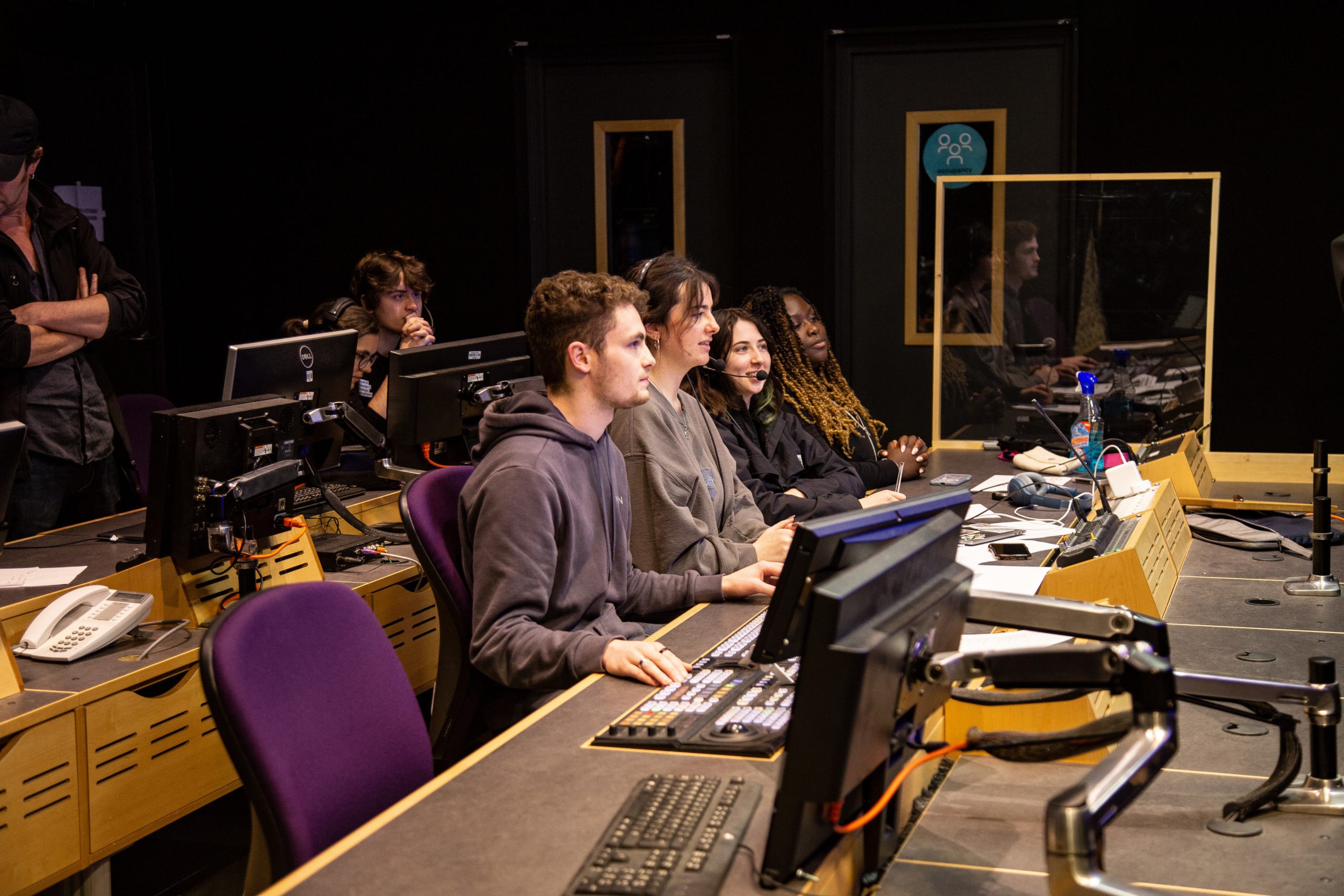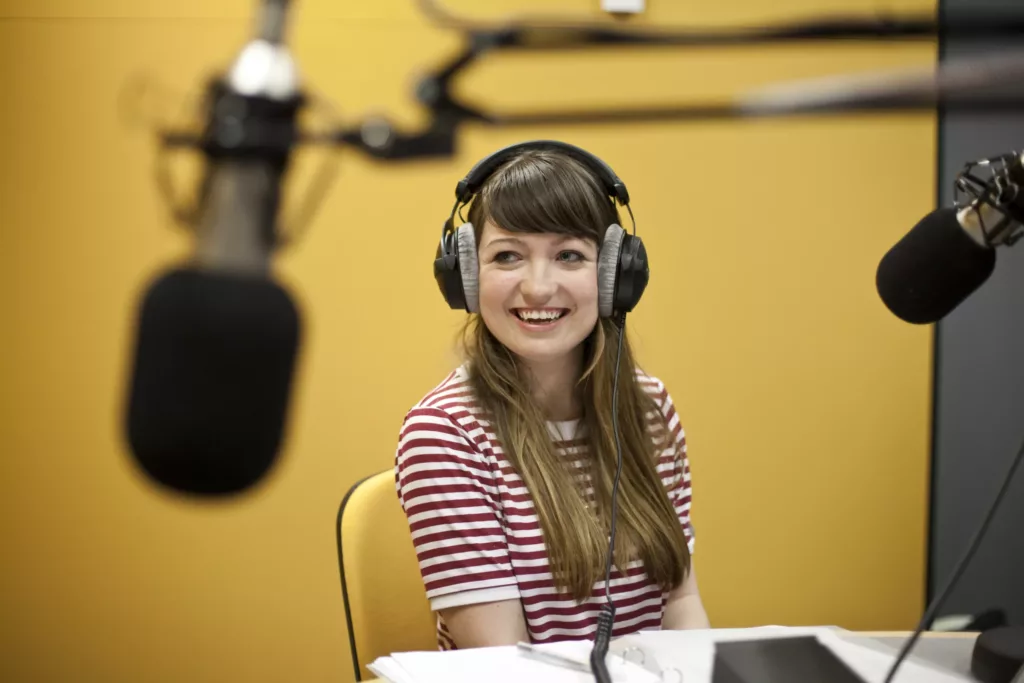
Certificate in Radio + Podcast Production (Full-Time)

8 Jan 2024
- 20 Feb 2024
Apply By
19/12/2023
Apply To
IADT
ECTS Points
10 (Level 9 Award)
Delivery Mode
On campus
Course Code
DL116
Duration
7 weeks
Fees
1100


19/12/2023
IADT
10 (Level 9 Award)
On campus
DL116
7 weeks
1100

The aim of this course is to immerse you in a real-world newsroom, radio studio and location production environment so that you develop your production skills and gain a significant command of technical abilities required of all forms of broadcast radio and podcasting.
This course presents you with an opportunity to develop your practical skills in the broadcasting industry, to keep pace with the ever-changing technology and its use in broadcasting.
This is an intensive 7-week course where you will learn from industry professionals in our state-of-the-art facilities.
You will be joining the students on IADT’s MA in Broadcast Production
We will examine the broadcast landscape in Ireland, and explore ways to create ground-breaking radio and podcasts that resonate. We will listen to, and create multiple examples of audio content in a variety of styles for both live and online contexts. You will also be able to analyse radio journalism as a discipline, and evaluate contemporary audiences and how to reach them.
The following are some of the areas we will explore together:
• The Role of Radio and Podcast in Society: A Shared Experience in an increasingly atomised world.
• Styles and Forms – past, present and future (Golden age, Pirate, Commercial, Community, Public Service, Podcast).
• Idea Generation: How to generate original ideas and treatments that resonate.
• Building a Running Order.
• Sourcing and securing contributors.
• Planning and structuring programmes.
• Using sound effectively in radio and podcast features.
• Creating memorable, creative ads and promos.
• Live radio production roles and values.
• Ethical Journalism, diversity, access and representation.
• Outside broadcasts and overseas productions.
• Costing, budgeting and project management.
• Finding a home for your audio work: Successful pitching to broadcasters and Funding bodies.
• Technical aspects of radio production, including recording, editing, mastering, mic technique, studio operations.
The course will enable you to incorporate your skills into your production practices and in your future professional roles.
Professional pathways exist in the audio-visual, web and screen industries. Graduates go on to radio, online content providers, the broadcast media, advertisement agencies, production facilities, company in house production facilities, state and civil society bodies and indeed any group involved in the creation and distribution of audio content.
You may be interest in progressing to our MA in Broadcast Production
Classes take place from the 8th January to the 20th February 2024, every Monday, Tuesday, Thursday and Friday from 10am to 5pm on campus in the National Film School radio studio and newsroom.
The course is divided into two sections: Short Feature Production and Live Radio Production.
Assignment 1: Students will pitch, produce and deliver a short radio insert of 3-5 minutes duration on the subject of their choice. This is an individual assignment.
This assignment tests the learners’ ability to conceive of, plan, structure, produce and deliver broadcast quality short-feature content for radio. The learners will demonstrate skills such as storyboarding, narrative structuring, sourcing of contributors, interview skills, editing, use of sound and SFX and best practice in terms of ethics.
Assignment 2: This is a studio-based group assignment. Class will be divided into production groups. Each student will each produce an ‘as-live’ 20 minute radio show on the subject of their choice (Arts/Current Affairs/Magazine/Speciality). Students will crew each other’s shows, and each student will be assessed on their ability to Produce, Present and Tech Op a show. Alongside technical skills, focus will be on populating a running order, sourcing contributors, interview skills, and the generation of paperwork associated with live radio production (briefing notes, running orders, etc.).
You will need to have your own headphones, and a 16 or 32 GB SD card for recording purposes.
This course is suitable for students who have an undergraduate qualification of 2nd Class Honours or higher at Honours Degree level. Experience of the media industries is an additional advantage.
Applicants without a Level 8 qualification may be considered provided they can demonstrate Honours Degree equivalence which can be verified through the RPL (Recognition of Prior Learning) process.
As part of your application you will be required to submit:
OR
Applications for this course are now closed.
Please email any queries to Elena Somoza, IADT Creative Futures Academy Co-ordinator, at iadt@creativefutures.ie
A CFA scholarship encourages the participation of learners from sections of society that are significantly under-represented in higher education by offering one free place on all of our CFA short courses.
Through our CFA programmes, we offer a range of bursaries to help you gain the in-demand skills you need to develop your career.
Find Out More